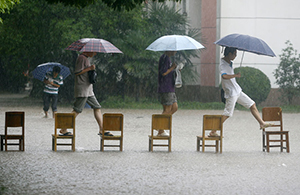Doha delivers 'dead' deal on climate change
By OP Rana (China Daily) Updated: 2012-12-11 07:50
Doha was not supposed to throw up any surprises, and it didn't. The Kyoto Protocol, for all practical purposes, is dead. The only binding global agreement to reduce greenhouse gas (GHG) emissions was to expire this year anyway. It's just that the UN climate change conference in Doha has given it an unceremonious burial before it could fulfill most of its promises.
On paper, the climate talks, which ended late on Saturday, may have extended a plan to combat global warming until 2020. But in reality, the deal will not be able to slow rising temperatures or prevent floods, droughts, heat waves and rising sea levels.
The extended Kyoto Protocol is expected to compel about 35 industrialized nations to reduce GHG emissions. But the 15-year-old protocol has been weakened by the withdrawal of Russia, Japan and Canada. The fact that the US never ratified the protocol means its remaining backers, led by the European Union and Australia, now account for only 15 percent of world's GHG emissions. So we can see how much emission would be reduced.
The developed world (perhaps with the exception of the EU) had always been reluctant to accept binding emission cuts, but until now it at least appeared to take measures to fight climate change and help poorer countries do the same. But Doha, for all its drawbacks, has helped pull the veil of pretension off many a developed country's face.
There was never any doubt about the intentions of the US. Those who were fooled by US President Barack Obama's victory speech in Chicago on Nov 7 into thinking he would lead the US, historically the greatest GHG emitter, into the battle against climate change failed to read the not so fine print.
The sentence in Obama's victory speech that left many an environmentalist jumping with joy was: "We want our children to live in an America that isn't burdened by debt, that isn't weakened up by inequality, that isn't threatened by the destructive power of a warming planet." Indeed, the US president was talking about protecting children from the impact of climate change, but then he was referring to American children, not children in the rest of the world.
There are too many powerful forces at play behind the scenes not only in the US, but also all the countries that have embraced free market economy. Profit is the language that the market understands, and market is the philosophy that most governments today follow.
It is this philosophy, seeped in profit and endless greed, which has prevented the developed countries to provide the promised $100 billion to the poorest countries to adapt to and fight climate change. The "new deal" struck in Doha indicates only $10 billion of climate fund would be available every year, which is only half of what the developed countries had promised to give between 2013 and 2015.
All these make what the organizers are calling a "Doha Climate Gateway" nothing but a dead end as far as the future of the world as we know it is concerned.
It was not surprising to see Japan, Canada and Russia "opt out" of the extended Kyoto Protocol. Japan with its overemphasis on nuclear energy and industrial production, Canada with its newly found shale gas reserves and huge logging industry and Russia with its massive oil and gas production are the last countries to heed the warnings of climate change.












